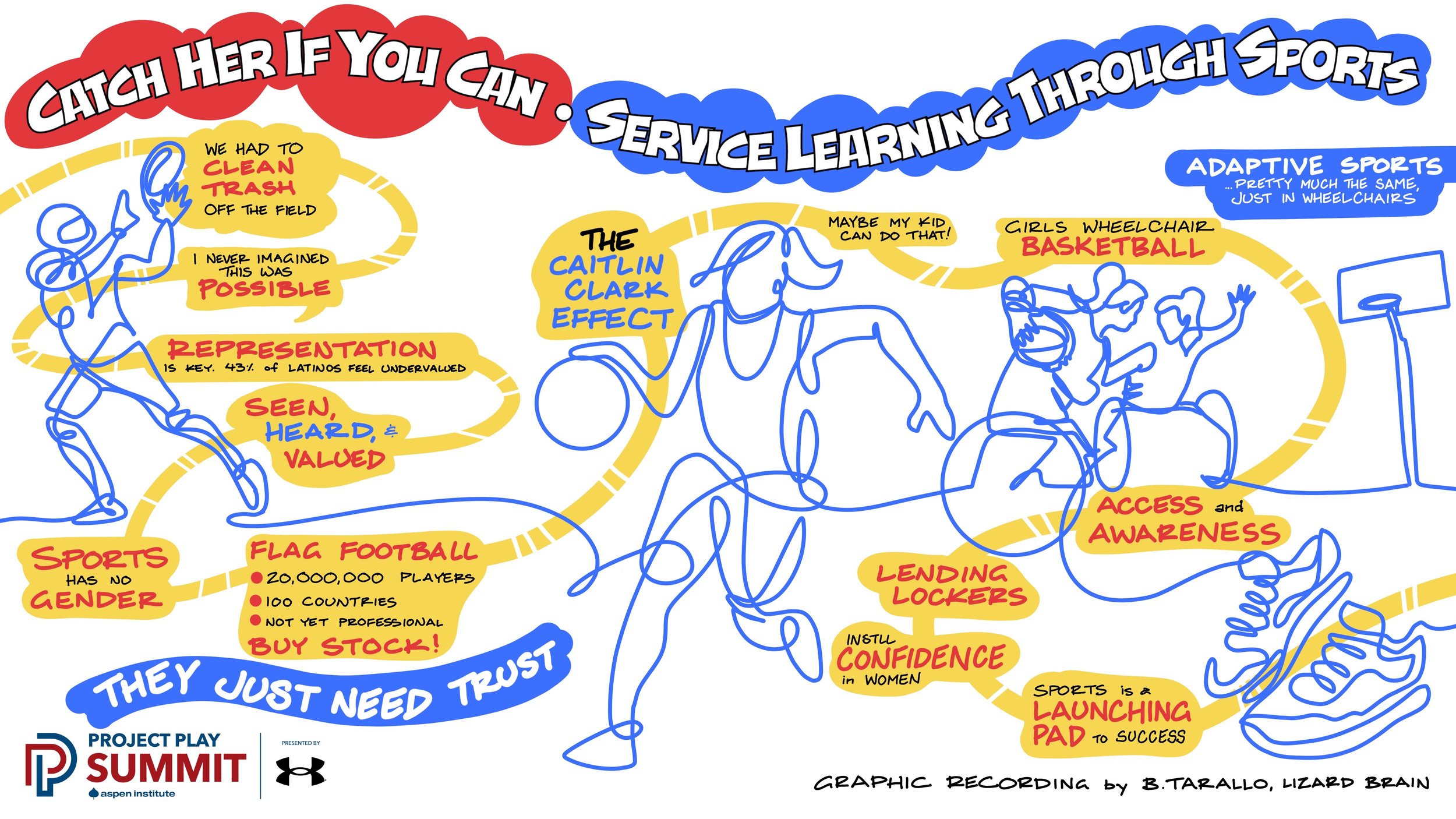Josie Portell (left) and Rishan Patel (center) speaks to USA Today reporter Christine Brennan at Project Play Summit 2024, May 15 in Baltimore.
Photo: Howard Korn for the Aspen Institute
- Baltimore as Beacon with Kevin Plank
- Health Equity in Youth Sports, featuring Mike Locksley, Marci Goolsby & Mayrena Hernandez
- The Key to 63, featuring Christina Hixson, Kim Hegardt & Kevin Martinez
- Catch Her If You Can, featuring Diana Flores
- Service Learning Through Sports, featuring Josie Portell and Rishan Patel
- Building a Youth Sports Policy Agenda
- State of Play Session, featuring Maryland Gov. Wes Moore
Inspired by the School Sports Equity Toolkit, the Aspen Institute’s Service Learning through Sports is a one-year program that provides micro-grants and mentorship programming to select U.S. high school students who lead, or aim to lead, a project or initiative addressing an issue of sports access. At the Project Play Summit, two high school students explained how they are making a difference for their communities and teammates.
Moderated by USA Today’s Christine Brennan, the Service Learning Through Sport panel featured Josie Portell, founder of a girls wheelchair basketball camp, and Rishan Patel, founder and CEO of Alley-Oop Kids. Both Portell and Patel took action in youth sports after noticing inequalities in the opportunities some young athletes have to participate.
Portell was diagnosed at birth with spina bifida, a spinal cord-related disability. Her experiences as a female disabled basketball player shaped her passion for service.
“In wheelchair basketball, at the junior level, it’s a male-dominated sport,” Portell explained. “I know first-hand the experience (supporting females in wheelchair basketball) has had on my confidence.”
Patel was only 8 years old when he worked with his brother to start Alley-Oop Kids, a youth sports equity nonprofit that provides underserved youth organizations with free sports equipment and storage. Under the Alley-Oop Kids umbrella, Patel started the Lending Lockers program, an initiative that installs lockers with free sports equipment at schools and organizations most in need. To date, Patel said they have donated 230 lockers globally, providing access to sports for over 175,000 kids.
For Patel, philanthropy would not have come without the personal growth he felt through playing youth sports.
“I used to be super shy,” he said. “But as I got better at basketball and it became more of my identity, I really started to flourish socially too. It gave me this confidence that was really special.”
“Even if you’re not the best player on the team, there’s something about being in that environment … that really builds confidence,” he later added.
Although still in high school, Portell and Patel have developed perspectives on where their programs can continue making an impact. For Patel, that includes finding like-minded peers who could be making a similar difference.
“I want to empower others to do what I’m doing. That’s the way this can spiral into something bigger than 230 lockers,” Patel said. “Even kids in my own school have come to me (and said), ‘I didn’t know these kids didn’t have access, what can I do?’”
Portell wants to expose more children with disabilities to sports. “We hear a lot about people with disabilities who feel like they don’t have access … and they do, they just often don’t know about it,” she said.
Portell’s inaugural wheelchair basketball camp for disabled elementary school girls in greater St. Louis will begin Aug. 3, with support from the Disabled Athlete Sports Association. Portell, a high school junior, remains appreciative of the opportunities sports have provided her.
“Adaptive sports have changed the entire course of my life,” she said. “I’m gonna go to college because I have the life skills that wheelchair basketball has taught me.”
Student journalists from the University of Maryland’s Shirley Povich Center for Sports Journalism covered the Project Play Summit on behalf of the Aspen Institute. More of their stories can be found here. For Project Play’s recap of the Summit, click here. For the full Summit agenda, including replays of every session, click here. The full panel with Portell and Patel is available here.


